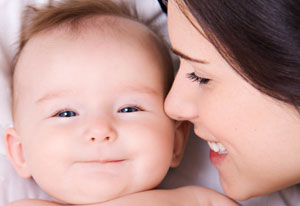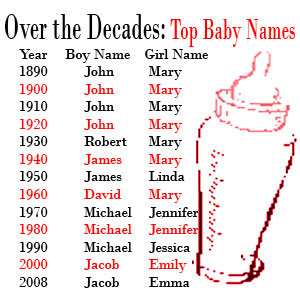Unique Baby Names Not Just a Celebrity Fad
New SDSU study shows most common names are not as popular as in the past

Unique and unusual baby names are not just a celebrity fad.
According to new research out of San Diego State University, American parents are giving their children more unique names and the most common names are nowhere near as popular as in decades past.
Study looks at 325 million babies born in U.S.
In the largest and most comprehensive study ever done on trends in the uniqueness of names, researchers analyzed the names given to more than 325 million babies born between 1880 and 2007.
In 1955, nearly one-third (32 percent) of boys received one of the ten most popular names. But by 2007, less than one in 10 got a common name.
For girls, in 1955, about one in four (22 percent) received one of the ten most popular names. But by 2007 that number was only one in 12.
“These days, you don’t have to be the child of a celebrity to get a name as unique as Shiloh, Suri or Apple,” said study co-author Jean Twenge, SDSU psychology professor and co-author of The Narcissism Epidemic: Living in the Age of Entitlement.
Uniqueness is more common
According to Twenge, this shift illustrates the growing interest of Americans in uniqueness and standing out instead of sameness and fitting in.
“This huge change in how parents name their babies is a particularly vivid illustration of the shift toward valuing uniqueness in American society,” Twenge said.
“Parents used to give their children common names so they would fit in and their names would be easy to pronounce and spell. Now, they give their child a unique name so their kid will stand out and be a star.”

According to the research, in 1955, the average first grade class of 30 children would have at least one boy named James, which was the most popular name for boys born in 1949. In 2013, six classes will be necessary to find only one Jacob, even though that was the most common boys’ name in 2007.
For both male and female names, the decrease in the use of common names was most dramatic during the 1990s. As late as 1990, half of boys received one of the 50 most common names, but by 2007 less than one-third did. The number of girls receiving one of the 50 most common names fell from 37 percent to 22 percent from 1990 to 2007.
Promoting narcissism?
According to study co-author W. Keith Campbell, this change happened at the same time that Americans seem to have embraced more individualistic traits such as assertiveness and self-esteem on psychological questionnaires.
“Unique names may have some benefits such as creating a more individual identity, but they run the risk of promoting separateness, which is linked to narcissism,” said Campbell, psychology professor at the University of Georgia and co-author of The Narcissism Epidemic: Living in the Age of Entitlement.
The study, which will be presented at the annual conference of the Association for Psychological Science in San Francisco on May 23, used the Social Security Administration database of social security card holders.



